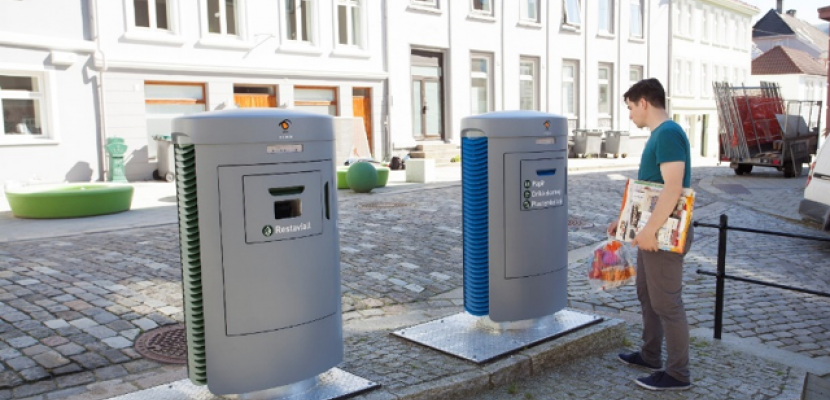Image

Bergen underground waste collection system
Published on 08 January 2019

Norway
Vestlandet
This is the good practice's implementation level. It can be national, regional or local.
About this good practice
Back in 2008, the Bergen city council decided that all future waste collection in the medieval city center should be shifted from bins and containers, to underground pipes. 2015 sees the official opening of BIR Nett – the underground waste collection system. Over the course of 2017 and 2018 the network is expanding and work is ongoing for many years to come. BIR Nett AS, a fully owned subsidiary of BIR AS, the local waste management company, is implementing the project. Municipal departments such as the civil engineering department, water & sewage department, the parks commission, building authorities, the public health department and representatives from city hall have all been consecutively involved within this urban development project.
Customers have to use an ID-key chip to access their allocated inlet. The inlets are multi-functional, i.e. both customers from private households (shopping bags), business customers (100l bags) and passers-by can use three different hatches. All customers have access to waste inlets 24 hours, 365 days a year. The solution can handle household waste, paper, plastic & cardboard. To secure a complete waste management solution, the system will be enriched its own solutions for glass & metal and bulky waste (trenched tanks and mobile recycling stations). Through a system of pipes and a vacuum principle it arrives to the terminal where the waste is collected.
Customers have to use an ID-key chip to access their allocated inlet. The inlets are multi-functional, i.e. both customers from private households (shopping bags), business customers (100l bags) and passers-by can use three different hatches. All customers have access to waste inlets 24 hours, 365 days a year. The solution can handle household waste, paper, plastic & cardboard. To secure a complete waste management solution, the system will be enriched its own solutions for glass & metal and bulky waste (trenched tanks and mobile recycling stations). Through a system of pipes and a vacuum principle it arrives to the terminal where the waste is collected.
Expert opinion
Accessibility and availability of containers for separate waste collection are important prerequisites to increase the recycling rates in line with the revised Waste Framework Directive. The network of containers for different waste fractions such as paper, card board, glass, plastic is still underdeveloped in many regions and countries. Underground collections systems can provide a very good solution in those locations where the piping systems can be placed without difficulties. The integration with other infrastructure services as described in the current practice can offer synergies and better cost efficiency. Other regions and municipalities can take inspiration from the good practice but should check both investment and running costs of such a collection system under local conditions.
Works at
Interreg Europe Policy Learning Platform
Resources needed
The estimated construction cost for the underground waste collection system was NOK 1.239.860.000. These costs include the development of the pipe system, costs for all inlets and the construction of two waste collection stations. Households pay a fee which covers a large part of expenses.
Evidence of success
In areas with the new system in place, the old waste bins and containers have been removed, giving the inhabitants of Bergen more space, better hygiene and lowered risk for fire. In addition the new system has had very few technical problems since being put into operation. At the same time, it has contributed to a higher level of recycling among the residents living in the city center.
Potential for learning or transfer
A bold political decision in 2008 - all waste handling in the city center to be moved underground. Underground waste system wass constructed together with other infrastructure: district heating, rehabilitation of water/waste water, cable infrastructure. Pay-as-you-throw fee is now integrated in system with ID-registration. These all brought a high quality system with no down-time, good-looking inlets, with higher service-level results in satisfied customers.
Few challenges which this system can be a solution could solve are the city's narrow roads and limited space for waste storage and many wooden houses (fire hazard) posing a fire hazard. Recycling in general was limited before introducing the underground waste system with integrated PAYT-fee.
Installing underground pipe system is only possible with good cooperation with other infrastructure utilities. Collecting household- and commercial waste together is possible with ID-tracking
Few challenges which this system can be a solution could solve are the city's narrow roads and limited space for waste storage and many wooden houses (fire hazard) posing a fire hazard. Recycling in general was limited before introducing the underground waste system with integrated PAYT-fee.
Installing underground pipe system is only possible with good cooperation with other infrastructure utilities. Collecting household- and commercial waste together is possible with ID-tracking
Further information
Website
Good practice owner
You can contact the good practice owner below for more detailed information.
Organisation
Municipality of Bergen, Waste Management company BIR AS

Norway
Vestlandet
Contact
Project Manager
